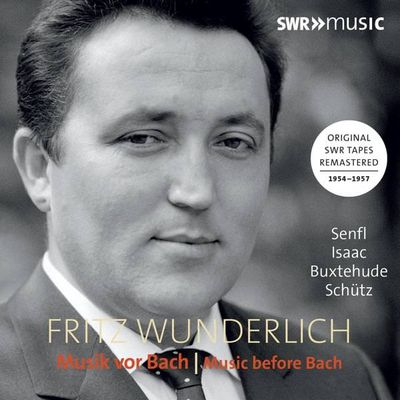Wunderlich, Fritz: Music before Bach

1954-1957
2018
Adam Rener
Adam von Fulda
Alessandro Grandi
Anon.
Christoph Graupner
Dietrich Buxtehude
Erasmus Lapicida
Heinrich Isaac
Heinrich Schütz
Johann Philipp Krieger
Johann Rosenmüller
Ludwig Senfl
Paul Hofhaimer
Fritz Wunderlich
CD 1 Ludwig Senfl: Lust hab ich ghabt zuer Musica
CD 1 Ludwig Senfl: Entlaubet ist der Walde
CD 1 Ludwig Senfl: Ich armes Käuzlein kleine
CD 1 Ludwig Senfl: Unsäglich Schmerz
CD 1 Ludwig Senfl: Ein alt bös Weib
CD 1 Ludwig Senfl: Wie wohl ich trag
CD 1 Anon.: Ein Blümlein fein hab ich erwählt (Liederbuch des Arnt von Aich)
CD 1 Paul Hofhaimer: Was ich durch Glück hab Gunst erlangt (Liederbuch des Arnt von Aich)
CD 1 Heinrich Isaac: Ach weiblich Art (Liederbuch des Arnt von Aich)
CD 1 Anon.: Ich schell mein Horn im Jammerton (Liederbuch des Arnt von Aich)
CD 1 Erasmus Lapicida: Es lebt mein Hertz in freud und scherz (Liederbuch des Arnt von Aich)
CD 1 Adam Rener: Mein höchste Frucht (Liederbuch des Arnt von Aich)
CD 1 Adam von Fulda: Apollo aller Kunst ein Hort (Liederbuch des Arnt von Aich)
CD 1 Alessandro Grandi: Plorabo die ac nocte
CD 1 Heinrich Schütz: Es steh' Gott auf, dass seine Feind' zerstreuet werden SWV 356 for 2 tenors, 2 Violins and basso continuo (German Concerto)
CD 1 Heinrich Schütz: Was betrübst du dich, meine Seele SWV 353 for 2 tenors, 2 Violins and basso continuo (German Concerto)
CD 2 Johann Rosenmüller: Vau. Et egressus est a filia Sion omnis (Second Lamentation for the Wednesday of the Passion Week, from: Lamentationes Jeremiae Prophetae)
CD 2 Johann Rosenmüller: Aleph. Ego vir videns paupertatem meam (Third Lamentation for the Thursday of the Passion Week, from: Lamentationes Jeremiae Prophetae)
CD 2 Johann Rosenmüller: Incipit oratio Jeremiae Prophetae (Third Lamentation for Good Friday, from: Lamentationes Jeremiae Prophetae)
CD 2 Christoph Graupner: Wie bald hast du gelitten (Passion Cantata)
CD 2 Dietrich Buxtehude: O wie selig sind, die zu dem Abendmahl des Lammes berufen sind BuxWV 90 (Arie sub communione)
CD 2 Dietrich Buxtehude: Surrexit Christus Hodie BuxWV 99 (Easter Cantata)
CD 2 Dietrich Buxtehude: Wachet auf, ruft uns die Stimme BuxWV 101 (Cantata)
CD 2 Johann Philipp Krieger: Wo willst du hin, weil's Abend ist for 2 tenors and basso continuo (Sacred concerto)
Unique collection of Fritz Wunderlich’s recordings of Early Music predating J. S. Bach. A new installment from SWR’s comprehensive series of Fritz Wunderlich’s recordings. A celebrated, must-hear voice. Recordings 1954–1957 Digitally remastered from the original SWR tapes.
When we think of Fritz Wunderlich as an interpreter of “early music”, it's the parts he sang in Bach’s passions and oratorios that immediately come to mind. In this respect, Germany’s probably greatest tenor had already gone down in the annals of recording history during his short lifetime (26 September 1930–17 September 1966). His international fame in later years was due not only to his outstanding performances as a Mozart tenor but also to his artistic versatility: his repertoire included Romantic opera, Lieder and operetta as well as contemporary and popular music.
However, Wunderlich’s first recordings of early music and of music composed in the centuries before Bach are less well-known. They were recorded by the young singer from 1954 to 1957 and are featured on this double CD; the sound quality has been technically enhanced to maximum effect. Apart from the Bach contemporary Christoph Graupner (1683–1760, CD 2, track 6), the repertoire presented on these CDs covers a time span that ranges from two centuries to some decades before Johann Sebastian Bach’s birth.
The double CD begins with six of his songs that can be considered as true gems of the Lied. This is especially true of the autobiographical Lust hab ich g’habt zur Musica (I really fancied music). Those songs were recorded in the large broadcasting hall of the regional studio of the SWR broadcasting corporation in Freiburg, in October 1954. These songs belong to Fritz Wunderlich’s first ever sound recordings.
The composers on CD 2 mark the threshold of the Baroque period, the beginning of which is usually dated at the turn from the 16th to the 17th century. This CD mainly features sacred music by Heinrich Schütz, Johann Rosenmüller (1619–1684) and Dietrich Buxtehude (1637–1707). Quite fascinating is how effortlessly Wunderlich was able to integrate himself into an ensemble of singers. Even though Wunderlich always considered Mozart and Bach to be his “fixed stars”, he also succeeded wonderfully in adding extra sparkle to the music dating from the time before Bach.